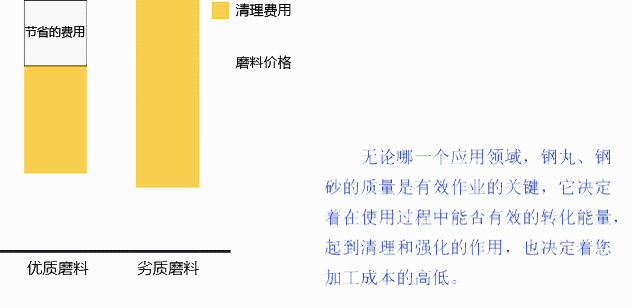In the field of application, we advocate that customers choose high cost-effective abrasives. The key to high cost-effective abrasives is high quality.
Standard of high-quality steel shot and steel sand: It can act more kinetic energy on the surface of workpiece, effectively clean and strengthen, have a long enough fatigue life, reduce consumption in use.
Chemical composition:
Chemical composition is the most basic index of steel shot and steel sand. It will determine the microstructures of steel shot and steel sand and the effect of heat treatment afterwards. Carbon (C) content should be moderate. Silicon (Si) manganese (Mn) can improve the strength and hardness of steel shot, and should be as high as possible (0.8% is the best). Sulphur (S) phosphorus (P) is a harmful element, which makes the steel shot brittle and leads to premature rupture. It should be as low as possible (0.03% is the best).
Hardness:
If the steel ball or steel sand is too soft, the cleaning speed will be reduced and the work efficiency will be reduced. When shot peening is strengthened, too soft steel pellets can not produce suitable residual stress, and the force of low hardness pellets can not be compensated by increasing impact time. Excessive hardness will produce unsatisfactory surface morphology, increase the probability of fragmentation of projectiles, cause excessive consumption, and wear equipment, increase equipment maintenance costs, so appropriate hardness is also critical.
Microstructure:
The microstructures of steel shot (sand) must be able to resist deformation and reduce energy loss and fatigue life when it acts on the working face. Tempered martensite is the most fatigue-resistant. In addition, the fragile carbides must be reduced in the microstructure, otherwise the steel shot (sand) will rupture prematurely and increase the usage.
Physical defects:
Steel balls (sand) must contain as little physical defects as possible. Because of the production technology used, there are always some physical defects in steel balls (sand). The production process must be controlled by the corresponding process to reduce the proportion of defective particles.
Fatigue life:
Fatigue life is the ability of steel balls (sand) to resist breakage when working on the working surface. Abrasives with the longest fatigue life will become the most economical Abrasives if they can convert the appropriate energy into cleaning.




